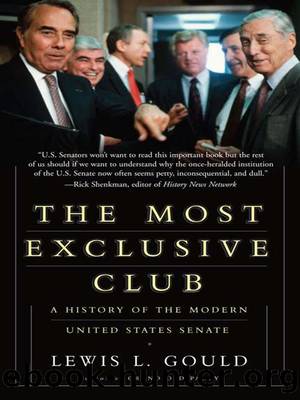The Most Exclusive Club by Lewis Gould

Author:Lewis Gould [LEWIS L. GOULD]
Language: eng
Format: epub
Publisher: Basic Books
Published: 2012-01-08T16:00:00+00:00
CHAPTER ELEVEN
The Senate Club in the Age of Joe McCarthy
THE SUDDEN ACCESSION OF HARRY TRUMAN TO THE PRESIDENCY ON April 12, 1945, and the ensuing end of World War II opened a turbulent eight years in senatorial politics. The power of the conservative coalition reached a peak of influence and importance. The Republicans looked more and more to Robert Taft as their intellectual leader and partisan guide. The divided Democrats found that their southern wing had the power to prevent civil rights legislation and indeed most other social reform programs. The Club, two decades in the making, set the pattern for how the upper chamber behaved. Truman and his new administration had to adapt to that inescapable legislative reality.
The volatile issue of civil rights thrust itself forward as African-American veterans and advocates of racial equality pressed for justice and change in the segregated South. Since any legislative remedies had to run the Senate obstacle course, the filibuster and the power of the southerners to wield that device reappeared throughout the postwar era. Conservatives linked civil rights and Communism as twin threats to their supremacy and used the stigma of internal subversion to assail the goals of those clamoring for attention to racial injustice.
With the advent of the Cold War and the threat from first the Soviet Union and then Communist China, the intertwined issues of antiCommunism and internal subversion moved to the front of the Senate’s concerns. By 1950, with the rise of Joseph R. McCarthy to national prominence, the Senate commenced a long struggle with that gentleman who stretched the rules of the chamber in new and unexpected ways. Eventually McCarthy was tamed, but the techniques that he employed became afterward one more weapon for lawmakers who were intent on using the Senate for their own purposes.
Senator Joseph R. McCarthy of Wisconsin came to the Senate as part of a Republican surge in the 1946 elections. He had ousted the incumbent, “Young Bob” La Follette, in the Republican primary and then gone on to victory in the fall voting. All over the country, Republicans duplicated McCarthy’s success. The first year of Truman’s presidency had brought economic and political turmoil in the aftermath of war. High prices, labor unrest, and apprehension about the mounting rivalry with the Soviet Union made voters uneasy and ready for change after fourteen years of Democratic rule. Lawmakers had passed some important legislation, including the Employment Act of 1946, which set prosperity as a national goal and committed Congress to measures designed to maintain the country’s economic health. None of it registered with the restless electorate in the postwar era. The Republican question was “Had Enough?” and it struck home with a testy nation.1
The opposition gained thirteen seats to bring their numbers to fifty-one in the upper house. For the first time since 1930, they had control of the committees and issues. In addition to McCarthy, whose fame lay three years in the future, the GOP added such men as John W. Bricker of Ohio, John J.
Download
This site does not store any files on its server. We only index and link to content provided by other sites. Please contact the content providers to delete copyright contents if any and email us, we'll remove relevant links or contents immediately.
The Secret History by Donna Tartt(16606)
The Social Justice Warrior Handbook by Lisa De Pasquale(11485)
Thirteen Reasons Why by Jay Asher(7780)
This Is How You Lose Her by Junot Diaz(5753)
Weapons of Math Destruction by Cathy O'Neil(5029)
Zero to One by Peter Thiel(4816)
The Myth of the Strong Leader by Archie Brown(4785)
Promise Me, Dad by Joe Biden(4440)
Stone's Rules by Roger Stone(4412)
Beartown by Fredrik Backman(4403)
How Democracies Die by Steven Levitsky & Daniel Ziblatt(4392)
The Fire Next Time by James Baldwin(4336)
100 Deadly Skills by Clint Emerson(4070)
A Higher Loyalty: Truth, Lies, and Leadership by James Comey(4024)
Rise and Kill First by Ronen Bergman(4008)
The David Icke Guide to the Global Conspiracy (and how to end it) by David Icke(3875)
The Farm by Tom Rob Smith(3869)
Secrecy World by Jake Bernstein(3773)
The Doomsday Machine by Daniel Ellsberg(3725)
